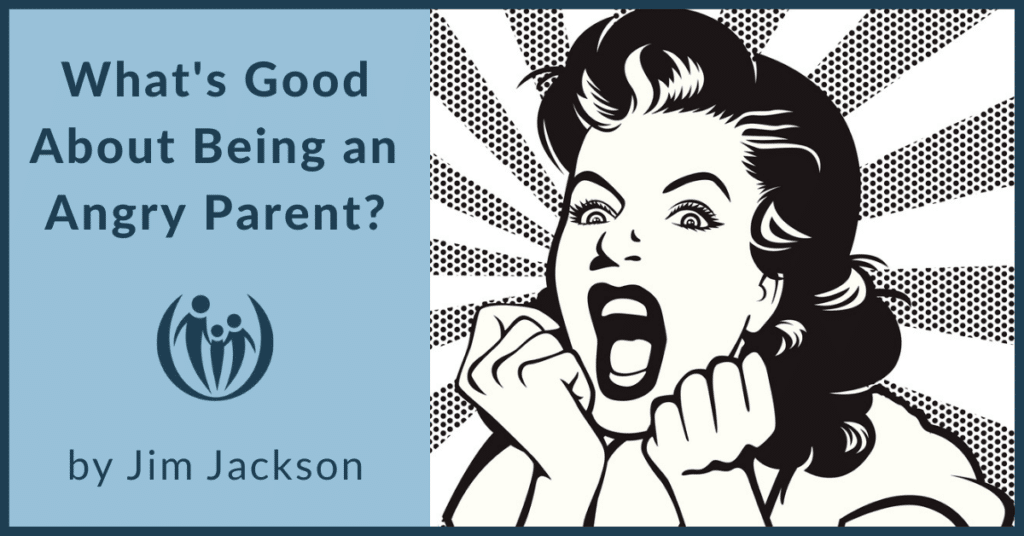
What’s Good About Being an Angry Parent?

Anger is tough to understand. Many parents, in the name of putting a stop to their kids’ misbehavior, tend to react quickly. This reaction usually doesn’t give much thought to the deeper layers of what’s going on in both the child and the parent.
Is there any good that can come from being an angry parent?
If parents are to engage constructively with their kids’ anger, they must first look more closely at their own anger. Anger is a God-given emotion that signals when something important to you is blocked. To help kids with their anger you can start by understanding your own. Consider, “What’s so important to me right now?” You might even discover that there’s some other emotions underneath that your anger is protecting.
Looking at the reasons behind your own anger (when it is your child who’s acting angry) likely feels unnatural. It takes new ideas and new attitudes. It’s more normal and natural to greet kids’ anger with your own anger, frustration, commands to stop, punishment, or some combination of these. While reacting this way may compel kids to “get in line”, it does nothing to teach new skills for constructively managing anger.
My experience as an angry parent
Engaging well with kids’ anger starts by understanding our own. The Bible tells us to “be angry and not sin” (Ephesians 4:26). This is hard. Anger is great for awareness, but not so great for action! The “sin that so easily entangles” (Hebrews 12:1) is perhaps more visibly evident in the anger experience than at any other time.
By recognizing that anger is a God-given emotion, intended to help us know what’s important to us, we can become more constructive in addressing our anger. From this perspective we can consider, “What is my anger about?”
For example, there was the day I got angry about all the piles of everyone’s stuff on the workbench in our garage. The workbench had become one of those catch-all spaces for everyone’s “I don’t know what to do with this bulky thing” stuff.
It’s important to me to have a clutter-free work space when I need to use the workbench. The operative words here, “when I need.” So I didn’t pay much attention to the piles until they were in my way. Then I got quickly irritated. Without thinking about it I simply reacted and headed quickly into the house with a raised voice, directed to whomever might be listening, “The workbench is cluttered and I am NOT okay with that! If any of this is yours you’d better get it out of here fast!”
Was there wisdom and grace in my response?
Nope.
My wife heard me and lovingly pointed out that some of the stuff was hers, because she was working on a project. More humbling, she pointed out that some of it was mine, and that the mess of junk on another “catch all” counter in our home office was entirely mine.
What about me contributed to this anger? Insensitivity, lack of observation, and my own hypocrisy. I was sinning. I had to admit that what was important to me was not just cleanliness, but immediate gratification, quick control, and my agenda.
The ability to quickly recognize this and say it out loud helped me quickly recover, confess my attitude, and shift gears. I then was more respectful in my request of the kids and Lynne to move the things on the workbench so I could work there.
Listen in as we continue the discussion on anger in our podcast, “Why Do I Feel So Angry?”
Selfish vs. unselfish goals
Your emotions are a window into your soul, and anger can bring rich insight by helping you identify your goals. Understanding your own anger begins by developing the skill to say out loud the things that contribute to your big emotions. Anger is often about a blocked goal; something is getting in the way of your own agenda.
But is it selfish? Like the disciples arguing over who was the greatest? Or unselfish? Like Jesus driving the swindlers out of the temple court?
By simply asking the question, “What’s so important to me right now?” you might realize that your goals (or motivations) can impact the way you address the situation.
For example:
“I just want to stop stepping on toys!” vs “I really do want my kids to learn responsibility that will serve them well in life.”
“I just want peace and quiet!” vs “I really do want my kids to grow in a respectful relationship so they can enjoy each other.”
If you’re like we were, what’s important to you as a parent is probably a mixture of selfish and unselfish goals. Whether you grow in awareness about this or not, your kids will get a sense of it.
So when you feel angry, take an honest look below the surface. That will help you take better responsibility for your feelings and then choose your actions and words thoughtfully. You can confess your selfish goals, and then shift gears to respond from your desires that are about your child’s ultimate good.
That might look like…
[confess] “Ok, I blew up because my foot hurts right now after I just stepped on your Lego. I’m sorry. [shift] But I really do want to help you learn to care for these toys I just stepped on. Do you want my help as you organize them? Or do you want to do this on your own?”
Or…
[confess] “I’ve had a tough day and I just wanted some peace and quiet, so I yelled. I’m sorry. Will you forgive me? [Then – shift] I know you’re really frustrated. Let’s take a break and everyone can think about what they wish they might have done differently.”
For grace to invade your anger journey, it’s vital to first look inward. This frees you to model humility and grace for yourself, as you then engage with your kids and their anger challenges.
Related Posts
What’s underneath the surface?
Another helpful question to ask is, “What’s going on beneath the surface of my anger?” This may be a bit harder to sort out, but often, beneath the surface of anger are other more vulnerable emotions. If you feel sad, anxious, confused, or ashamed you might use anger as a weapon to hide and protect those vulnerable emotions.
Let’s look under the surface of the previous examples:
You might feel anxious that your child will never learn to be responsible.
Or, you might feel ashamed because there’s so much disrespect in your home.
Better understanding the source of your anger, and learning to express it more constructively are essential skills to guiding children through their anger.
But if emotions truly are a window into the soul, this journey can also deepen your own intimacy with God. Like the Psalmists, you can be fully authentic with the One who knows your thoughts before there is a word on your tongue. And then you can model for your kids receiving the rich comfort of God’s loving presence and wisdom!
When my heart was grieved and my spirit embittered, I was senseless and ignorant; I was a brute beast before you. Yet I am always with you; you hold me by my right hand. You guide me with your counsel, and afterward you will take me into glory. Whom have I in heaven but you? And earth has nothing I desire besides you.
Psalm 73:21-25
A prayer of blessing for you
If you feel like an angry parent, we would love to pray a prayer of blessing for you. Please insert your name in the blank, or the name of a loved one you’d like to lift up in prayer.
Father, may __________ sense you holding his/her hand in compassion, not judgment. Jesus, surround and fill ________ with your wide, long, high and deep love. Holy Spirit, come alongside __________ to guide with your counsel, so he/she can move forward in wisdom, not shame. May _______’s children receive the overflow from the grace that washes over __________. We ask all these things confidently because of Jesus’ work on the cross!
Dealing with anger can be tough. If you want help implementing these principles with your family, read more about our coaching options.
Download our FREE in-depth ebook Helping Kids With Anger. It will provide thoughtful insights and creative ideas to help your struggling child.







